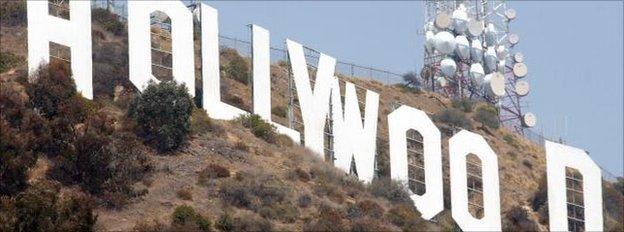Hollywood goes to war on pirates
- Published

Hollywood wants to stop piracy in its tracks but will its strategy work?
A High Court judge has ruled in favour of the movie industry and ordered the UK's largest ISP BT to block users from a site that shares links to free movies and TV shows.
It is being hailed as a victory for the creative industries which claim to lose millions of pounds of revenue to illegal downloaders every year.
Even though the decision was taken a long way away from Hollywood, the ripples will be felt across the pond.
But not everyone is convinced that blocking or any other technical measure is the answer.
Floodgates
The case, brought by the Motion Picture Association, compels BT to cut off access to Newzbin 2, a members-only site which aggregates a large amount of the illegally copied material found on Usenet discussion forums.
BT has already raised a number of questions about the ruling, including who will pick up the bill for blocking to be implemented.
It is also concerned about the consequences of accidentally blocking an innocent site, because the MPA believes it to be one of Newzbin's possible incarnations.
"If someone sues then who will pay? We need clarification," said Simon Milner, BT's head of group policy at BT.
Another issue for the company is the MPA's determination that it censor Newzbin by using Cleanfeed - the blocking technology that currently prevents access to websites featuring images of child sex abuse.
"We don't touch Cleanfeed. The Internet Watch Foundation send a list of sites to block and it is an automated system. It is not possible to add in URLs to that list," he said.
The MPA's lawyer Simon Baggs said he did not buy this argument
"I find it hard to believe that they can't just add it or they could just create another list," he said.
Rightsholders will be hoping that these details can be ironed out when the two parties meet again in court in October.
BT, for its part, said it would not appeal the ruling and welcomed the legal clarity on what it described as a complex issue.
The case is expected to open the floodgates for other, similar court orders.
"We will be asking other ISPs to comply with the order", Mr Baggs told the BBC.
Voluntary scheme
One thing ISPs will be hoping is that the legal case takes the heat off ongoing government attempts to create a voluntary web blocking agreement between rightsholders and ISPs.
"It does beg the question about whether we need another process," said Mr Milner.
The Internet Service Providers' Association agreed.
"While the discussions about a voluntary process have been going on, there was always this case in the background that people were aware could change everything.
"It is now shown that rights holders can go to court and, with good evidence, get a result. It probably means that there is no need for a voluntary scheme," said an ISPA spokesman.
But Mr Baggs thinks a voluntary agreement would be "preferable" to having to resort to court each time.

For determined pirates there are always ways around blocks, said BT
Legitimate content
BT described the system was "flawed" because of possible workarounds.
"A determined infringer can get around the block by using a proxy server," said Mr Milner.
More serious are the implications for how web content is governed in the future, according to the Open Right Group.
The campaign group agreed with BT that technological solutions are "naive". Even worse, it said, there is a real danger that legitimate content will be cut off.
"Who decides what content is blocked?" said ORG campaigner Peter Bradwell.
It is a question that has also worried Google's chairman Eric Schmidt.
At a recent conference he said that web blocking could be used by censorious governments to filter content they deemed politically sensitive.
He said Google would fight any attempts to introduce web blocking in the US.
Mr Baggs, from the MPA, admitted that some legitimate content may slip through the net.
"If a bookshop has just one shelf of illegal books but it refuses to remove it shouldn't be surprised if it is closed down. Similarly if a passage in a book is deemed libellous the only solution is to destroy the book until it is republished without the libel," he said.
But, he added, ultimately, it would be up to a judge to decide what is "appropriate".
Future acts?
Websites such as Newzbin 1 and 2 have so far evaded the law by changing their name, location and domain.
The MPA is keen that such evasion should end with the ruling.
"If it is obvious that it is fundamentally the same operation we can apply the order to a new domain. If there is any doubt about it, BT can apply to the court," he said.
Newzbin 2 is expected to deliver its view of the verdict via its blog but it told the BBC that it has some questions over the order.
"The judgment talks about blocking all domains and subdomains but some of these are entirely legal.
"The blog subdomain contains nothing but news speech and opinions. Why should BT be required to block that?" said Mr White, the anonymous representative of the website.

Where does the ruling leave the Digital Economy Act?
Digital future?
The fact that rightsholders seem to have successfully secured a relatively swift closure of one of their nemesis sites via the eight-year old Copyright, Designs and Patents Act throws into doubt the future of the brand new Digital Economy Act.
The DEA had piracy as one of its main priorities, and proposes a range of solutions.
The legislation may have been rushed through Parliament in the wash-up period before the last election, but implementing it has proved a much more long drawn-out process.
At the heart of the DEA is a mass mailing campaign - to target illegal downloaders and persuade them to desist - but to date no letters have been sent.
BT and TalkTalk issued a legal challenge to the act, claiming it had not been properly debated and was unworkable, which held the process up to a degree.
That challenge was thrown out but since then little has happened.
"The government could progress but we have heard nothing. No-one is sending out any notices," said Mr Milner.
According to the Department of Culture, Media and Sport it is now necessary to pass two extra pieces of legislation - one dealing who will pay for the letter writing campaign and one on the details of how the system will work - before it can progress.
A spokesman for the DCMS said it was looking carefully at today's verdict to see how it would impact government policy on piracy.
- Published28 July 2011
- Published27 July 2011
- Published28 June 2011